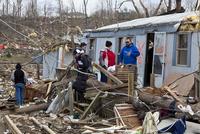-
States eager to attract cybersecurity companies
As the threat of cyberattacks grows, Maryland, Washington D.C., and Virginia want to cash in on the growing business of cybersecurity. Analysts say that several states are using tax breaks to get in on the $207 billion cybersecurity industry, which is expected to show “impressive growth” in the next five years.
-
-
New guide highlights three cyber security game changers
Cybercrime is on the rise, and it will grow even faster if organizations ignore an emerging group of cybersecurity game changers: always-on connectivity, an increasingly IT-centric society, and a new class system that separates people by technology skills.
-
-
Smart technologies tackle global food shortage
From monitoring soil moisture to measuring oyster heartbeats, Aussie farmers can help to tackle the global food shortage and significantly increase their productivity by taking advantage of new smart farming technologies enabled by next generation broadband networks.
-
-
$110 billion in damages makes 2012 second only to 2005 in terms of weather-related disasters

The U.S. National Climatic Data Center’s (NCDC) says that 2012 saw eleven weather and climate disaster events each with losses exceeding $1 billion in damages. This makes 2012 the second costliest year since 1980, with a total of more than $110 billion in damages throughout the year. The 2012 total damages rank only behind 2005, which incurred $160 billion in damages due in part to four devastating land-falling hurricanes.
-
-
Factors influencing spinach E. coli contamination before harvest
Researchers have identified a variety of factors that influence the likelihood of E. coli contamination of spinach on farms prior to harvest. They found that E. coli contamination of spinach on farms in Colorado and Texas was 172 times more likely if the produce field was within ten miles of a poultry farm, and sixty-four times more likely if irrigated by pond water.
-
-
Senate immigration bill would reduce deficits by $200 billion over decade: CBO
A long-awaited report by the nonpartisan Congressional Budget Office offered a major victory for the bipartisan Gang of Eight senators and the draft immigration overhaul they drafted: the detailed report finds that the immigration bill now being debated in the Senate would reduce federal deficits by nearly $200 billion over the next decade even with higher spending on border security and government benefits. The report estimates that over the following decade — from 2024 to 2033 — the deficit reduction would be even greater, reaching an estimated $700 billion.
-
-
Shale oil and shale gas resources globally abundant: report
Estimated shale oil and shale gas resources in the United States and in 137 shale formations in forty-one other countries represent 10 percent of the world’s crude oil and 32 percent of the world’s natural gas technically recoverable resources, or those that can be produced using current technology. A new report estimates technically recoverable 345 billion barrels of world shale oil and 7,299 trillion cubic feet of world shale gas.
-
-
Immigration bill includes benefits to some industries
The immigration reform bill currently being debated on Capitol Hill, in addition to giving immigrants a pathway to citizenship, strengthening border security, and requiring better enforcement of laws which aim to prevent the hiring of undocumented workers, also includes benefits for specific industries and groups.
-
-
Newark to raise water rates to pay for infrastructure

A report presented to Newark’s city council said that the town’s water and sewer rates will be increased by more than 60 percent over the next ten years in order to pay for $500 million in infrastructure repairs to the town’s faulty and outdated meters, century-old, leaky pipes, and broken valves.
-
-
Natural gas from fracking, coal have similar energy return on investment (EROI)
The value of a fuel’s long-term usefulness and viability is judged through its energy return on investment, that is, the comparison between the eventual fuel and the energy invested to create it. A new study finds that shale gas has a return value which is close to coal.
-
-
Risk assessment of shale gas fracking to biodiversity

Fracking, the controversial method of mining shale gas, is widespread across Pennsylvania, covering up to 280,000 km² of the Appalachian Basin. New research explores the risks posed to biodiversity including pollution from toxic chemicals, the building of well pads and pipelines, and changes to wetlands.
-
-
Texas to appeal FEMA decision not to declare West, Texas a disaster area
The Federal Emergency Management Agency (FEMA) said President Obama would not declare West, Texas a disaster area in the wake of the massive fertilizer plant explosion there two months ago, and Texas governor Rick Perry is not happy. FEMA said Texas did not make the case the state lacked funds for cleanup and recovery efforts.
-
-
New Jersey faces costly water infrastructure upgrades

Before Hurricane Sandy hit New Jersey, state officials knew they had much work ahead of them to update the state’s water infrastructure. The damage Sandy inflicted only highlighted the inadequacies of New Jersey’s outdated wastewater, stormwater, and drinking water infrastructure. Upgrading the system will be costly, but not doing so will be costlier.
-
-
Increased U.S. crude oil production leads to dramatic fall in oil imports
The U.S. Energy Information Administration (EIA) issued its Annual Energy Outlook 2013 (AEO2013), which shows that under the assumption of crude oil production of about ten million bbl/d between 2020 and 2040 – which means total U.S. liquid fuels production (which includes crude oil, natural gas liquids (NGL), refinery gains, biofuels, and other liquid fuels) of more than eighteen million bbl/d in 2040 – net import of oil drops to 7 percent or less of total demand compared to 40 percent in 2012.
-
-
Defense companies turn their attention to border security

The U.S. involvement in the Iraq war is over, and the country will soon withdraw its troops from Afghanistan. Federal budgets cuts shrink agencies’ ability to conduct research and development. Faced with these realities, military contractors have begun to focus on border security. What many defense companies find especially appealing is the fact that the Senate immigration bill conditions any move toward legalizing the status of more than eleven million illegal immigrants in the United States on the strengthening of security along the U.S.-Mexico border.
-
- All
- Regional
- Water
- Biometrics
- Borders/Immig
- Business
- Cybersecurity
- Detection
- Disasters
- Government
- Infrastructure
- International
- Public health
- Public Safety
- Communication interoperabillity
- Emergency services
- Emergency medical services
- Fire
- First response
- IEDs
- Law Enforcement
- Law Enforcement Technology
- Military technology
- Nonlethal weapons
- Nuclear weapons
- Personal protection equipment
- Police
- Notification /alert systems
- Situational awareness
- Weapons systems
- Sci-Tech
- Sector Reports
- Surveillance
- Transportation
Advertising & Marketing: advertise@newswirepubs.com
Editorial: editor@newswirepubs.com
General: info@newswirepubs.com
2010-2011 © News Wire Publications, LLC News Wire Publications, LLC
220 Old Country Road | Suite 200 | Mineola | New York | 11501
Permissions and Policies
Editorial: editor@newswirepubs.com
General: info@newswirepubs.com
2010-2011 © News Wire Publications, LLC News Wire Publications, LLC
220 Old Country Road | Suite 200 | Mineola | New York | 11501
Permissions and Policies
